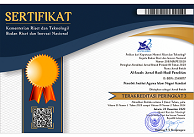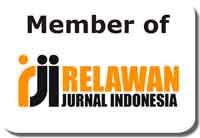Relasi Kekerabatan Patronase Masyarakat Muna
Abstract
Keywords
Full Text:
PDFReferences
Adams, Carl, and Andreas Neef. 2019. "Patrons of Disaster: The Role of Political Patronage in Flood Response in the Solomon Islands." World Development Perspectives 15 (August). https://doi.org/10.1016/j.wdp.2019.100128.
Ahimsa-Putra, Heddy Shri. 2007. Patron & Klien di Sulawesi Selatan; Sebuah Kajian Fungsional-Struktural. Yogyakarta: Kepel Press.
Akhtar, Aasim Sajjad. 2011. "Patronage and Class in Urban Pakistan: Modes of Labor Control in the Contractor Economy." Critical Asian Studies 43 (2): 159–84. https://doi.org/10.1080/14672715.2011.570565.
Anwar, Muhammad Fiaz. 2018. "Patronage and Political Affiliation: Case Study of Village Jhok Bodo, District Dera Ghazi Khan, West Punjab" 98–116.
Beresford, Alexander. 2015. "Power, Patronage, and Gatekeeper Politics in South Africa." African Affairs 114 (455): 226–48. https://doi.org/10.1093/afraf/adu083.
Chandavarkar, Sumeeta Shyamsunder. 1997. "Patron-Client Ties and Maoist Rural China", Thesis MA pada Departmen of Political Science, University of Toronto.
Corstange, Daniel. 2018. "Kinship, Partisanship, and Patronage in Arab Elections." Electoral Studies 52: 58–72. https://doi.org/10.1016/j.electstud.2018.01.006.
Davies, Peter (eds.). 1977. The American Heritage Dictionary of The English Language. New York: Dell Publishing Co., Inc.
Eilenberg, Michael. 2012. "The Confession of a Timber Baron: Patterns of Patronage on the Indonesian–Malaysian Border." Identities 19 (2): 149–67. https://doi.org/10.1080/1070289x.2012.672841.
Ferrol-Schulte, Daniella, Sebastian C.A. Ferse, and Marion Glaser. 2014. "Patron-Client Relationships, Livelihoods and Natural Resource Management in Tropical Coastal Communities." Ocean and Coastal Management 100: 63–73. https://doi.org/10.1016/j.ocecoaman.2014.07.016.
Flammini, Roxana. 2010. "Elite Emulation and Patronage Relationships in the Middle Bronze: The Egyptianized Dynasty of Byblos." Tel Aviv 37 (2): 154–68. https://doi.org/10.1179/033443510x12760074471026.
Gouldner, Alvin W. 1997. "The Norm of Reciprocity: A Prilimi- nary Statement, " dalam Ramlan Surbakti, ed., Teori Teori Sosial Mikro. Surabaya: Unair.
Harris, Marvin. 1997. Culture, People, Nature; an Introduction to General Anthropology. New York: Longman.
Haviland. 1999. Cultural Anthropology. New York: Harcourt Brace College Publisher.
Hefni, Moh. 2009. “Patron-Client Relationship Pada Masyarakat Madura”, Jurnal Karsa. XV (1), April: 15-24.
Hidayat, Ade. 2017. “Pola Pewarisan Nilai Yang Berimplikasi Bimbingan Pada Pancakaki Bani Nurya”, JOMSIGN: Journal of Multicultural Studies in Guidance and Counseling. 1 (1), Maret: 99-122.
Javid, Hassan. 2011. "Class, Power, and Patronage: Landowners and Politics in Punjab." History and Anthropology 22 (3): 337–69. https://doi.org/10.1080/02757206.2011.595006.
Johnson, Paul D. 1994. Teori Sosiologi: Klasik dan Modern, Jilid I dan II, Terj. Robert M.Z. Lawang. Gramedia: Jakarta.
Keith, Legg. 1983. Patron Client and Politicism Institute of International Studies. Berkeley: University of California.
Koentjaraningrat. 1972. Beberapa Pokok Antropologi Sosial. Jakarta: Dian Rakyat.
Komter, Aaefke. 2005. Social Solidarity and The Gift. New York: Cambridge University Press.
Leonard, David K., Jennifer N. Brass, Michael Nelson, Sophal Ear, Dan Fahey, Tasha Fairfield, Martha Johnson Gning, et al. 2010. "Does Patronage Still Drive Politics for the Rural Poor in the Developing World? A Comparative Perspective from the Livestock Sector." Development and Change 41 (3): 475–94. https://doi.org/10.1111/j.1467-7660.2010.01647.x.
Maus, Marcell. 1994. The Gift, Form and Function Echange in Archaic Societies, Terjem. Jakarta: Yayasan Obor Indonesia.
Mccauley, John F. 2013. "Africa’s New Big Man Rule? Pentecostalism and Patronage in Ghana.” African Affairs 112 (446): 1–21. https://doi.org/10.1093/afraf/ads072.
Mirajiani, Ekawati S.Wahyuni, Arif Satria, Saharuddin, Tridoyo Kusumastantol. 2014. “Transformasi Pranata Patronase Masyarakat Nelayan: dari Ekonomi Moralitas Menuju Ekonomi Pasar”. Jurnal Komunitas; Reasearch&Learning in Sociology and Anthropology. 6 (1): 115-134.
Morgan, Stephen L., Ismaila Z. Mohammed, and Salisu Abdullahi. 2010. “Patron–Client Relationships and Low Education among Youth in Kano, Nigeria.” African Studies Review 53 (1): 79–103. https://doi.org/10.1353/arw.0.0236.
Parkin, Robert&Linda Stone, (Eds.). 2004. Kinship and Family; An Anthropological Reader. USA: Blachwell Publishing.
Polo Y La Borda, Adolfo. 2019. “Don Mauro’s Letters: The Marquis of Villagarcía and the Imperial Networks of Patronage in Spain.” Americas 76 (4): 555–83. https://doi.org/10.1017/tam.2019.70.
Popkin, Samuel L. 1979. The Rational Peasant; The Political Economy of Rural Society in Vietnam. Illinois, F Peacock Publisher Inc..
Purwaningsih, Titin. 2015. “Politik Kekerabatan dan Kualitas Kandidat di Sulawesi Selatan”. Jurnal Politik. 1 (1), Agustus: 97-123.
Schneider, William M&Mary Jo Schneider, 2004. “Selako Male Initiation”. Jurnal Ethnology, 30 (3).
Scott, James C. 1972. “Patron-Client Politics and Political Change in Southeast Asia”. Dalam Jurnal American Political Science Review.66 (1): 91-113.
Setiawan, Eko. 2012. “Eksistensi Budaya Patron Klien dalam Pesantren: Studi Hubungan antara Kiai dan Santri”. Jurnal Ulul Albab, Volume 13, Nomor 2. DOI: http://dx.doi.org/10.18860/ua.v0i0.2372: 137-152.
Shahab, Yasmin Zaki. 2005. “Sistim Kekerabatan sebagai Katalisator Peran UlamaKeturunan Arab di Jakarta”. Jurnal Antropologi Indonesia. 29 (2): 123-141.
Smith, Daniel Jordan. 2004. “Burials and Belonging in Nigeria: Rural-Urban Relations and Social Inequality in a Contemporary African Ritual”. Jurnal American Anthropologist. New Series.106 (3): 569-579.
Supartiningsih. 2010. “Konsep Ajjoareng-Joa’ dalam Tatanan Sosial Masyarakat Bugis (Perspektif Filsafat Sosial)”, Jurnal Filsafat. 20 (3), Desember: 217-238.
Suprihatin, Sri Emy Yuli. 2002. “Hubungan Patron Klien Pedagang Nasi Kucing di Kota Yogyakarta”. Jurnal Penelitian Humaniora. 7 (I), April: 147-16.
Turmudi, Endang. 2003. Perselingkuhan Kiyai dan Politik. Jakarta: LP3ES.
Viere, Grace M. 2001. “Examining Family Ritual”. The Family Jounal. 9, Juli: 285-288.
Vokes, Richard. 2016. “Primaries, Patronage, and Political Personalities in South-Western Uganda.” Journal of Eastern African Studies 10 (4): 660–76. https://doi.org/10.1080/17531055.2016.1278324.
Webster. 1975. Webster's New Twentieth Century Dictionary. Edisi Kedua (Oxford: Oxford University Press.
Zamroni, Imam. 2007. “Kekuasaan Juragan dan Kiai di Madura”, Jurnal Karsa. XII (2): 168-179.
DOI: http://dx.doi.org/10.31332/ai.v0i0.2794
Copyright (c) 2021 Asliah Zainal, Muhammad Asrianto Zainal, Waode Ainul Rafiah, Wa Kina Wa Kina

This work is licensed under a Creative Commons Attribution-NonCommercial-ShareAlike 4.0 International License.










